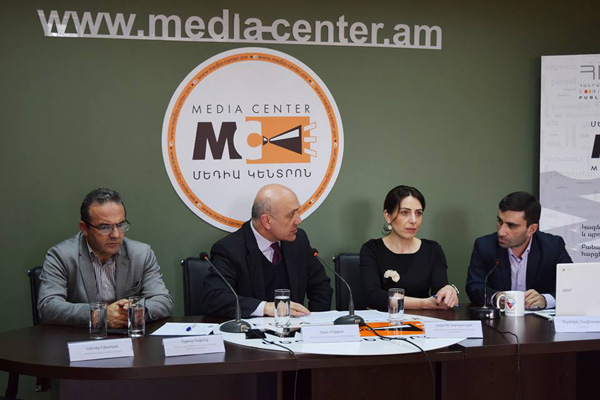According to Haykuhi Harutyunyan, head of the “Rights Protection Without Borders” NGO, the conclusion drawn from the amendments to the Criminal Code is that the use of such a law is a clear indication of the limitation of the democratic space.
At the discussion entitled “Amendments to the Criminal Code: security or pressure on dissidents?”, Haykuhi Harutyunyan clarified: in terms of content, these changes mean that every person who will ever attempt to make public calls on terrorism, to propagate or justify it, this law does not provide clear definitions for that, it will be left for the investigative bodies. It turns out that a person who will ever attempt to speak about these issues can be brought to liability: “Armenia, in terms of public safety, has never been assessed to be in the risk zone of security, according to which the policy of toughening the criminal liability is very appropriate. We have not had such a shock in terms of social security, in which case these changes would be necessary”.
According to Mrs. Harutyunyan, after these changes the media and human rights defenders will be targeted: “The media are targeted for their technique of covering, the vocabulary used within the implementation of their coverage functions. There is no guarantee that just the coverage of the case by journalists will not be considered by this article and that individual persons will not be subject to criminal liability. Human rights defenders are also endangered, who can take over the protection of those individuals who will be charged with terrorism”.
According to Haykuhi Harutyunyan, the law does not contain the principle of fair balance, in which case the possible groundless and unreasonable attempts of the government to bring people to criminal liability can be guaranteed and restrained.
Chairman of the Committee to Protect Freedom of Expression Ashot Melikyan is concerned: this is a direct threat to freedom of speech as it can be considered very subjectively: “I think they came up with this idea after the “Sasna Tsrer” case, when they saw that there was a layer in society that was understanding this wrath and considering that this was not a terrorist but a desperate act. In terms of power, the government applied everything and prevented it. Now the government wants no talks, no discussion over it at all. If we give such a law to force structures, there are quite arbitrary individuals there, who can view even a small analysis as propaganda and justification for all this. Logic leads to the fact that it makes sense to envisage criminal liability for political and state figures who have prepared ground for such a terrorist act”.
Ashot Melikyan is concerned that if this bill becomes a law, and if something extraordinary happens again, the public gathers there and says that they act the right way because the authorities have left no other choice, they can arrest all those people making reference to the law.
According to Arthur Sakunts, Chairman of the Helsinki Citizens Assembly Vanadzor Office, this law has a punitive nature: “The authorities are concerned: the actions that they can presume to be terrorism may continue and have public support. So they are trying to restrict those via criminal methods. Under the name of terrorism, they will pursue human rights defenders, journalists and civil initiatives that can criticize the actions of the authorities”.
Touching upon the actions of the “Sasna Tsrer” and their qualification, Mr. Sakunts reminded: “The “Sasna Tsrer” armed group’s rebellion attempt was not qualified as a terrorist act even by the law-enforcement bodies of the Republic of Armenia. But let us consider the changes also from the point of view of the text. The text set in this law may also be included in the codes of North Korea, France, and Cuba. The real problem is this: if we have a proposal that is applicable in both ‘democratic’ and ‘non-democratic’ countries, then something is wrong with that text”.
Tatev HARUTYUNYAN
























































